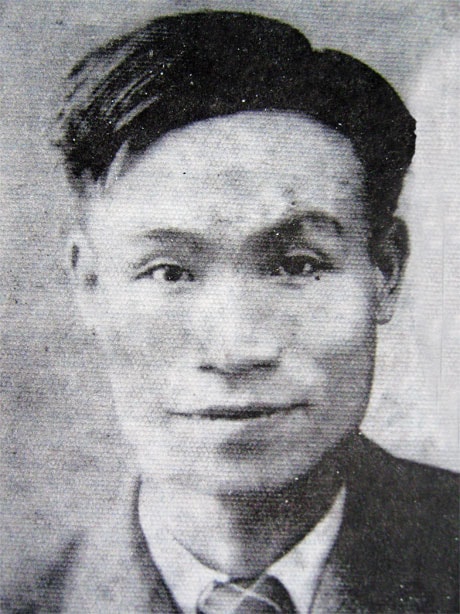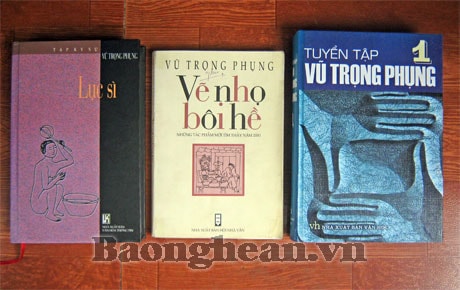Writer - journalist Vu Trong Phung with reportage in Vietnam
(Baonghean.vn) -“I have the impression that Vu Trong Phung is a great writer, very great, no less than any great writer of other literary traditions... Up to now in Vietnam, no one has written as many and as well as Vu Trong Phung!”
(Dr. Peter Zinoman, American Vietnamologist)

Portrait of Vu Trong Phung (1938)
In the first decades of the 20th century, Vietnamese society was full of violent changes in all areas of economic, political, cultural and literary life. This directly affected the country's fledgling press.
If in 1865, our country had only one newspaper, Gia Dinh Newspaper, then by early 1925 there were 35 newspapers. Seven years later, in 1932, this number skyrocketed to 132 newspapers. During the period of the Indochina Democratic Front (1936 - 1939), the press developed even more vigorously and the reportage genre, through many channels of introduction, gradually appeared, became familiar in the literary and journalistic world, and was studied and applied by many talented authors. And some authors became famous in this new reportage genre.
The 15-year historical period (1930 - 1945) is recognized by researchers as a period of development of reportage, leaving an indelible mark, a qualitative breakthrough of a series of reportage works capable of reflecting and covering quite comprehensively the color and appearance of social life in our country at that time.
Along with a number of prominent journalists including Trong Lang, writer-journalist Vu Trong Phung was a gifted writer and soon had immortal works in the reportage genre. Author Trong Lang published two books, “Being a citizen” (1938) and “The children” (1944). As for Vu Trong Phung, within just 6 years (from 1933 to 1938), he left behind 7 reports: “Traps for people” (1933), “The industry of marrying the West” (1934), “Representatives and representatives” (1935), “Teachers’ rice and teachers’ rice” (1936), “Drawing slander and clowns” (1936), “Luc si” (1937), “A district celebrating Tet” (1938) (1). And all seven of these reports, at the time, caused great resonance. Writing the preface to the work “The Industry of Westernization” (Phuong Dong Publishing House, 1936), Phung Tat Dac praised: “I do not want to consider this book as just a reportage. I want to put it among the works that have a wider influence, works that can point out the direction for literature and art, works that provide documents for future generations to examine the present day!”
In the above series of reports, the urban theme occupies the majority, overwhelmingly, because that is the forte of writer Vu Trong Phung, and reflects an objective reality of society: during the transition period of the feudal colonial regime, the city appeared and quickly became a gathering place, a hot spot, a topic very suitable for the reportage genre. Here, he caught the "right pulse" of people, society, human affairs, and from there contributed a unique voice through dedicated reports, becoming "The King of Reportage in the North" - according to the honorable way of calling of Phung Tat Dac at that time!
In the 1930s, Hanoi society was filled with social evils. Prostitution, drug addiction, theft, hooliganism... were rampant. Reports such as "Luc Si", "Com Thay Com Co", "Cam Nguoi", "Ky Nghe Ma Tay" directly addressed contemporary issues: human degeneration, money domination causing havoc, fierce competition depleting humanity...

Some recently published works of Vu Trong Phung
More specifically, let's see what Vu Trong Phung said through the report? That is the tragic fate of prostitutes, the poor life of servants, gambling and drinking... like incurable diseases. The report "Luc Si" can be seen as a sociological investigation into prostitution and its dire consequences. The official number of 5,000 prostitutes in a city of less than 180,000 people, accounts for 3% of the population. Meanwhile, the facility treating prostitutes (luc si) can only handle 200 people. And for every 4,000 newborns who die, on average about 1,000 children die because their parents have syphilis, or complications from that disease. Regarding the reportage "Luc Si", in Tuong Lai Newspaper No. 11, 1937, in an open letter to a reader, Vu Trong Phung expressed: "Please understand that, writing the reportage "Luc Si", I am not only a writer, but also a journalist. A journalist must tell the truth to everyone. If something has happened, my duty is only to inform everyone, not to worry about who will benefit from doing that duty?".
The “profession” of marrying Westerners is also a kind of long-term, disguised prostitution, described in detail by Vu Trong Phung in the report “The art of marrying Westerners”. The excellent report “The rice of teachers and the rice of teachers” revives the tragedy of a ragged army, from remote rural areas moving into the city to make a living by all kinds of jobs. Con Sen Duoi went to work at the age of 12, and at the age of 13 her virginity was taken away. Hanoi society “called out to the villagers to leave the dry and withered fields to come here to starve to death a second time... It made the price of human beings equal to that of animals, it made a group of young boys go to Hoa Lo prison and a group of young girls go into prostitution”. The report “Human trap” specializes in gambling; not only purely describing characters and events, Vu Trong Phung also boldly exposes the depraved nature of human beings before the unprecedented destructive power of money...
Educator and researcher Van Tam, when studying the memoir genre of Vietnamese medieval literature, generalized it into two basic characteristics: Real people, real events (documents rich in historical authenticity) and the appearance of the author's own narrative character "ego" (2). Today, although the memoir genre has a long history of development, these two basic characteristics are still recognized by writers. The writer Vu Trong Phung's narrative ego, through reportage, plays an important role, leading the story, shortening the distance between the work and the reader and highlighting aesthetic emotions. That narrative ego is rich in objectivity but still flexible, sometimes it is the author himself, sometimes it is a witness, making readers always feel like they are in the same story with the writer.
Dr. Tran Dang Thao, in his research on the narrative ego of writer Vu, also realized that this ego often reached a sharp, discreet commentary tone, or implied satire and profound criticism, directly revealing the writer's own perception and attitude towards things and phenomena (3).
In narrative prose, some genres such as memoirs, travelogues, reports, memoirs, diaries... are generally called "records", which are at the intersection between literature and journalism, and political commentary. According to literary researcher Lai Nguyen An, the composition of literary records is often popular in periods of literary history corresponding to historical and social periods with crises of old relationships, the emergence of a new way of life, increasing attention to the description of customs (4). Vietnamese literature in the 1930s of the 20th century is an example, here we witness the proliferation of reportage works on many social evils that are tending to "urbanize" irresistibly, and the reportage of Vu Trong Phung, which emerged from that, is a typical example and has increasingly high persuasive power!
With 27 years of his short life, including 10 years as a writer, writer Vu Trong Phung left behind a huge volume of short stories, novels, plays, essays, and especially a series of reports... for the country's literary and journalistic treasure. The ideological content has a strong value of denouncing society before the Revolution (1945), along with a sharp, elaborate and talented art, which has made his works have, are and will have a long-lasting influence on many generations of readers at home and abroad, especially for journalists pursuing the reportage genre.
In the Viet Bac War Zone, September 1949, poet To Huu made a very remarkable comment to the critics and readers at that time, who had many different ways of reading and understanding the writer: "Vu Trong Phung is not a revolutionary, but the revolution thanks Vu Trong Phung".
Although the history of the literary career of the writer Vu from before to after the August Revolution, and until recently, has had ups and downs, lacking consistency here and there, he has gradually remained a person "with an undisputed position". And in the genre of reportage, writer - journalist Vu Trong Phung has always been worthy of the title "King of Northern reportage", a "giant" of realistic literature in Vietnam in the first half of the 20th century!
____________________
(1) Please see the anthologies of Vu Trong Phung published in the early years of the 21st century such asSix of a Kind(collection of reports, Culture-Information Publishing House, 2002)Vu Trong Phung Collection(reportage in volume 1, Literature Publishing House, 2005);clown smear(including new works discovered in 2000, Writers Association Publishing House, 2000.
(2) The article "The King of Northern Reportage with the Memoir Style", printed in the bookVu Trong Phung, reportage and essay, Literature Publishing House, 2005, p.8.
(3) Tran Dang Thao, bookLiterary features of Vu Trong Phung, Thanh Nien Publishing House, 2008, p.104
(4) Lai Nguyen An,150 literary terms, Hanoi National University Publishing House, 2003, p.179
Kim Hung






